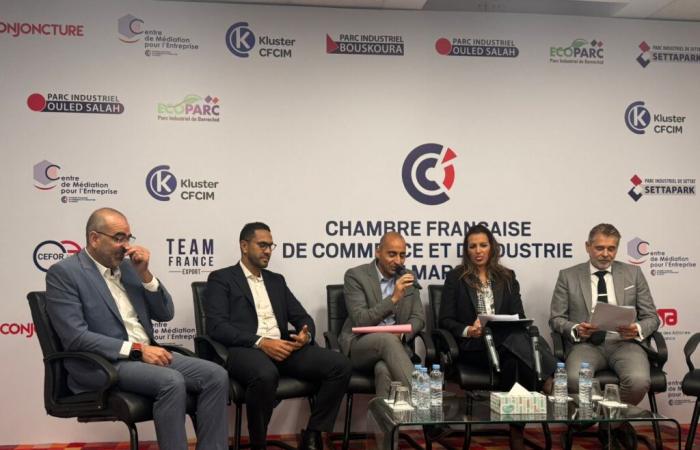Artificial intelligence and data analytics are emerging as key tools to anticipate customer needs and optimize services. However, challenges remain: distrust of digital tools, attachment to cash and the need to better support users. Expert opinion.
During a meeting organized by the CFCIM, this Wednesday, November 27, players in the Moroccan financial sector discussed the challenges of digitalization. In a context where technologies evolve at a pace franticTHE financial institutions Moroccan women must adapt quickly in order to meet the growing needs of their customers and adjust their strategies and processes.
Artificial intelligence and data form a powerful duo which allows us to rethink economic models. “If you can exploit this data, you can transform your business to make it more efficient and customer-centric,” said Maria Hzaine Meskini, head of the marketing and customer experience department at Société Générale.
Predictive analytics capabilities make it easier to anticipate customer needs and the adjustment of services in real time, reinforcing their satisfaction. Thus, “the objective is to refocus on complex processes while optimizing costs,” explained Abdelaziz Benyahya, Chief Transformation Officer West Africa at AXA Africa.
Digitalization for the financial sector
Financial institutions adopt digital tools to simplify transactions and improve the quality of services. For example, the adoption of digital processes has made it possible to reduce the use of paper and speed up the processing of requests, particularly during the health crisis.
In addition, the rise of mobile applications and online platforms has increased customer autonomy for day-to-day operations, while offering personalized advice for more complex needs, such as savings or loans.
Banks and insurance companies rely on data to personalize their services and better understand customer needs. Indeed, “thanks to behavioral segmentationit is possible to identify specific customer needs. This makes it possible to offer more relevant and better adapted offers,” said Ms. Meskini.
Thus, “artificial intelligence makes it possible to identify abnormal behavior, which makes it possible to act proactively to guarantee security and compliance”, specified Redouane Mabchourgeneral manager of Concentrix in the Maghreb. In this context, it is clear that AI not only enables speed of processing but also risk management.
The integration of data into customer management tools (CRM) allows for speed and rigorous time management. “What used to take weeks of analysis can now be done in minutes thanks to AI and CRM integration. This improves our ability to respond quickly to market expectations,” said Benyahya.
Making data speak means making informed decisions
To fully exploit data, financial institutions invest in suitable infrastructures, while consolidating an internal culture focused on data. “We have trained our teams to use this data as a key reference. This fundamentally changes the way we make our decisions,” said Ms. Meskini. In this sense, the establishment of “ data lakes » allows you to centralize information and improve decision-making.
The concept of “customer health” is essential. This term designates an approach where the emphasis is placed on the basic needs of the customer: to be listened to, valued and reassured.
“The client does not want to know what we can do, but what we can do for them,” explains Ms. Meskini.
With this in mind, Moroccan financial institutions must stop focusing only on l’innovation product and adopt a truly customer-centric approach. However, this shift is far from simple.
“We claim to be customer-oriented, but in reality, our priorities often remain focused on our products and innovations,” explains Hazim Sebbata, Managing Director of Cashplus and President of APEP – professional association of payment institutions.
Multicanal vs. Omnicanal
Moroccan financial institutions are gradually turning towards omnichannel to respond to growing expectations of their customers. Unlike the multichannelwhere each touchpoint operates in isolation, omnichannel offers a seamless experience.
Ms. Meskini explains: “We allow a client to start their process online, then finalize it in an agency. This continuity is essential.”
However, this transition is not without challenges. “Omnichannel requires an integrated architecture where data and systems work in the background, while providing a unified interface to the customer,” said Mr. Benyahya.
Despite obstacles linked to existing infrastructure and consumer habits, experts agree on one point: “this transformation is essential to modernize the customer experience and meet international standards”.
Challenges: Reassurance to overcome cultural obstacles
The digitalization of banks et assurances Moroccan technologies rely on a delicate balance between technology and human interaction. To convince, institutions must reassure their customers about the security and usefulness of digital tools. At the same time, they exploit data intelligence to refine their offers and optimize their processes.
The digitalization of services remains conditioned by the acceptance of users, and this is where a cultural paradox arises.
In Morocco, distrust of digital tools remains a major obstacle to the massive adoption of digital solutions. There was consensus on this observation: “Employees play a key role in supporting clients to adopt digital tools, step by step,” declared Ms. Meskini. This approach involves in-branch demonstrations, where advisors must explain to clients how to navigate banking apps or use online portals.
Transparency is essential to build trust: “Distrust of digital can be mitigated by clear communication on the use of data and highlighting the benefits for the customer,” added Hazim Sebbata.
Despite growing investments in digitalization, Moroccan companies face a major obstacle, which is the reluctance of customers to adopt these tools, mentioned Mr. Sebbata. The number one seller of plane tickets in Morocco remains the internet café.
This observation illustrates a lack of confidence towards digital tools, aggravated by persistent digital illiteracy. Even digital banking services, such as payment cards, are underutilized for commercial transactions. “80% of transactions made with a bank card concern withdrawals, showing that cash remains the preferred means of payment,” he explains.
Do you have a real estate project in mind? Yakeey & Médias24 help you make it happen!
© Media24. Any reproduction prohibited, in any form whatsoever, without written authorization from the Société des Nouveaux Médias. This content is protected by law and in particular law 88-13 relating to the press and publishing as well as laws 66.19 and 2-00 relating to copyright and related rights.






